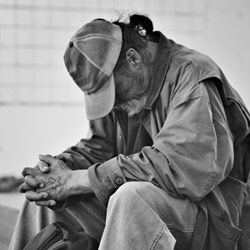
Chris Arnade is an atheist or so he says in an article in the Guardian that was published on Tuesday. He claims that his atheism was tested after working with and photographing homeless addicts in the South Bronx. He is shocked that the people he met weren’t atheists and then he somehow makes the false connection that having faith and hope is better than not being a homeless addict. He does a poor job selling religion.
They have their faith because what they believe in doesn’t judge them. Who am I to tell them that what they believe is irrational? Who am I to tell them the one thing that gives them hope and allows them to find some beauty in an awful world is inconsistent? I cannot tell them that there is nothing beyond this physical life. It would be cruel and pointless.
In these last three years, out from behind my computers, I have been reminded that life is not rational and that everyone makes mistakes. Or, in Biblical terms, we are all sinners.
We are all sinners. On the streets the addicts, with their daily battles and proximity to death, have come to understand this viscerally. Many successful people don’t. Their sense of entitlement and emotional distance has numbed their understanding of our fallibility.
Sonya addict bronx Sonya with her cross and rosary.Soon I saw my atheism for what it is: an intellectual belief most accessible to those who have done well.
The people who challenged my atheism most were drug addicts and prostitutes
Holding up homeless addicts as a model against atheism just seems silly. On one hand I could be just like those addicts and be a believer or I could be wealthy and be an atheist. Which would you choose?
It reads like an old noble savage trope used to justify Scientific racism back in the 19th century.
Those addicts and others in the Bronx are the strongest believers Arnade has met yet they are still homeless addicts or poor. If being a theist was better for a person then why hasn’t that belief led to a better life? Religious beliefs just mask the real issues that need to be addressed to try and get out of the hole they are in.
Karl Marx once wrote:
Religious suffering is, at one and the same time, the expression of real suffering and a protest against real suffering. Religion is the sigh of the oppressed creature, the heart of a heartless world, and the soul of soulless conditions. It is the opium of the people.
The abolition of religion as the illusory happiness of the people is the demand for their real happiness. To call on them to give up their illusions about their condition is to call on them to give up a condition that requires illusions. The criticism of religion is, therefore, in embryo, the criticism of that vale of tears of which religion is the halo.
Criticism has plucked the imaginary flowers on the chain not in order that man shall continue to bear that chain without fantasy or consolation, but so that he shall throw off the chain and pluck the living flower. The criticism of religion disillusions man, so that he will think, act, and fashion his reality like a man who has discarded his illusions and regained his senses, so that he will move around himself as his own true Sun. Religion is only the illusory Sun which revolves around man as long as he does not revolve around himself.
– Critique of Hegel’s Philosophy of Right (1843)
Helping people doesn’t require religion. It only requires a non-judgmental concern and compassion for our fellow humans. A person’s religious beliefs give the ‘why‘ they want to help someone but it doesn’t matter as long as you help the person. Active concrete help like donating money or volunteering are better than passively praying of course.
The Bible isn’t going to make them clean and sober or help them get a home. If it did then based on Chris Arnade’s assessment there shouldn’t be any homeless addicts.

